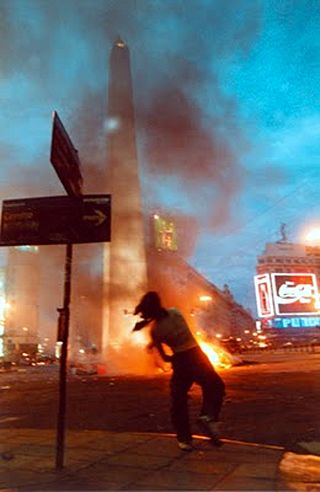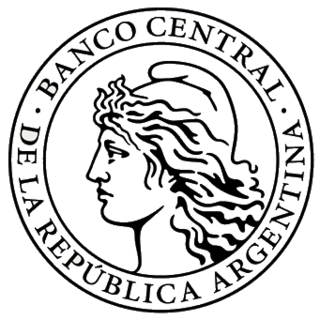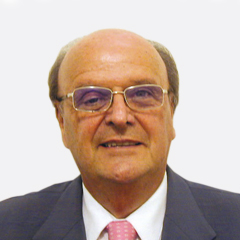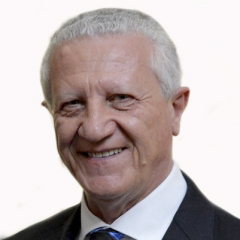
The economic history of Argentina is one of the most studied,owing to the "Argentine paradox". As a country,it had achieved advanced development in the early 20th century but experienced a reversal relative to other developed economies,which inspired an enormous wealth of literature and diverse analysis on the causes of this relative decline. Since independence from Spain in 1816,the country has defaulted on its debt nine times. Inflation has often risen to the double digits,even as high as 5,000%,resulting in several large currency devaluations.

Domingo Felipe Cavallo is an Argentine economist and politician. Between 1991 and 1996,he was the Minister of Economy during Carlos Menem's presidency. He is known for implementing the convertibility plan,which established a pseudo-currency board with the United States dollar and allowed the dollar to be used for legal contracts. This brought the inflation rate down from over 1,300% in 1990 to less than 20% in 1992 and nearly to zero during the rest of the 1990s. He implemented pro-market reforms which included privatizations of state enterprises. Productivity per hour worked during his five-years as minister of Menem increased by more than 100%. In 2001,he was the economy minister for nine months during the 1998–2002 Argentine great depression. During a bank run,he implemented a restriction on cash withdrawing,known as corralito. This was followed by the December 2001 riots in Argentina and the fall of Fernando de la Rúa as president.

Eduardo Alberto Duhalde is an Argentine former peronist politician who served as the interim President of Argentina from January 2002 to May 2003. He also served as Vice President and Governor of Buenos Aires in the 1990s.
The peso is the currency of Argentina since 1992,identified within Argentina by the symbol $ preceding the amount in the same way as many countries using peso or dollar currencies. It is subdivided into 100 centavos,but due to rapid inflation,coins with a face value below one peso are now rarely used. Its ISO 4217 code is ARS. It replaced the austral at a rate of 10,000 australes to one peso.
In macroeconomics and modern monetary policy,a devaluation is an official lowering of the value of a country's currency within a fixed exchange-rate system,in which a monetary authority formally sets a lower exchange rate of the national currency in relation to a foreign reference currency or currency basket. The opposite of devaluation,a change in the exchange rate making the domestic currency more expensive,is called a revaluation. A monetary authority maintains a fixed value of its currency by being ready to buy or sell foreign currency with the domestic currency at a stated rate;a devaluation is an indication that the monetary authority will buy and sell foreign currency at a lower rate.
The Mexican peso crisis was a currency crisis sparked by the Mexican government's sudden devaluation of the peso against the U.S. dollar in December 1994,which became one of the first international financial crises ignited by capital flight.

The 1998–2002 Argentine great depression was an economic depression in Argentina,which began in the third quarter of 1998 and lasted until the second quarter of 2002. It followed fifteen years of stagnation and a brief period of free-market reforms. The depression,which began after the Russian and Brazilian financial crises,caused widespread unemployment,riots,the fall of the government,a default on the country's foreign debt,the rise of alternative currencies and the end of the peso's fixed exchange rate to the US dollar. The economy shrank by 28 per cent from 1998 to 2002. In terms of income,over 50 per cent of Argentines lived below the official poverty line and 25 per cent were indigent;seven out of ten Argentine children were poor at the depth of the crisis in 2002.

The December 2001 crisis,sometimes known as the Argentinazo,was a period of civil unrest and rioting in Argentina,which took place during December 2001,with the most violent incidents taking place on 19 and 20 December in the capital,Buenos Aires,Rosario and other large cities around the country. It was preceded by a popular revolt against the Argentine government,rallying behind the motto "All of them must go!",which caused the resignation of then-president Fernando de la Rúa,giving way to a period of political instability during which five government officials performed the duties of the Argentine presidency. This period of instability occurred during the larger period of crisis known as the Argentine great depression,an economic,political,and social crisis that lasted from 1998 until 2002.
The Convertibility plan was a plan by the Argentine Currency Board that pegged the Argentine peso to the U.S. dollar between 1991 and 2002 in an attempt to eliminate hyperinflation and stimulate economic growth. While it initially met with considerable success,the board's actions ultimately failed. The peso was only pegged to the dollar until 2002.
Corralito is the informal name for the economic measures taken in Argentina at the end of 2001 by Minister of Economy Domingo Cavallo in order to stop a bank run which implicated a limit of cash withdrawals of 250 ARS per week. Electronic transfers and credit and debit card payments were not disrupted.
Apagón is a form of protest that was employed several times in some large cities of Argentina,during the economic crisis at the beginning of the 2000s. The justification for a blackout as a form of protest was a rejection of the proposed increase of fees of electricity and other basic services.

The Central Bank of the Argentine Republic is the central bank of Argentina,being an autarchic entity.

Jorge Milton Capitanich is an Argentine politician,businessman,and accountant. He served as Governor of Chaco Province from 2007 to 2013,from February to December 2015,and later from 2019 to 2023. A member of the Justicialist Party,he previously served as Chief of the Cabinet of Ministers from 2013 until 2015,serving under President Cristina Fernández de Kirchner,as intendente (mayor) of Chaco's capital city,Resistencia,and as National Senator,representing Chaco as well. Since 2007 he has also been president of the Club Atlético Sarmiento.

Felisa Miceli is an Argentine economist,and a former Minister of Economy and Production of Argentina. She was appointed by President Néstor Kirchner on January 28,2005,in place of Roberto Lavagna,and was the first woman ever to lead that ministry. She resigned to the position on July 16,2007,as prosecutors stepped up an investigation into a bag of cash found in her ministry offices.
In macroeconomics,crawling peg is an exchange rate regime that allows currency depreciation or appreciation to happen gradually. It is usually seen as a part of a fixed exchange rate regime.

Alfonso Prat-Gay is an Argentine economist and politician. Following the election of Mauricio Macri to the presidency on 2015,he became Minister of Economy.
Corralón was the informal name for the economic measures taken in Argentina at the beginning of 2002 by President Eduardo Duhalde during a bank run in which deposits and debt in dollars were exchanged to local currency at 1.4 per dollar for deposits and 1.0 for debt. Previously,the withdrawal of dollars was limited to $250 per week. After the forced exchanged,people no longer had any dollars on the system and those who had savings in US dollars lost 65% of their deposited value.

JoséIgnacio "Vasco" de Mendiguren is an Argentine industrialist and politician. He was chairman of the Argentine Industrial Union,director of the National Bank of Argentina,and Minister of Production during the presidency of Eduardo Duhalde. From 2013 to 2021,he was a National Deputy elected in Buenos Aires Province,as part of the Renewal Front and later as part of the Frente de Todos.

Jorge Emilio Sarghini is an Argentine economist and politician. Historically a member of the Justicialist Party,Sarghini has served in a number of political posts throughout his career,most notably as a member and president of the Buenos Aires Province Chamber of Deputies,as Minister of Economy of Buenos Aires Province during the successive administrations of Eduardo Duhalde and Carlos Ruckauf,and briefly as Secretary of Communications during Duhalde's interim presidency in 2002.











